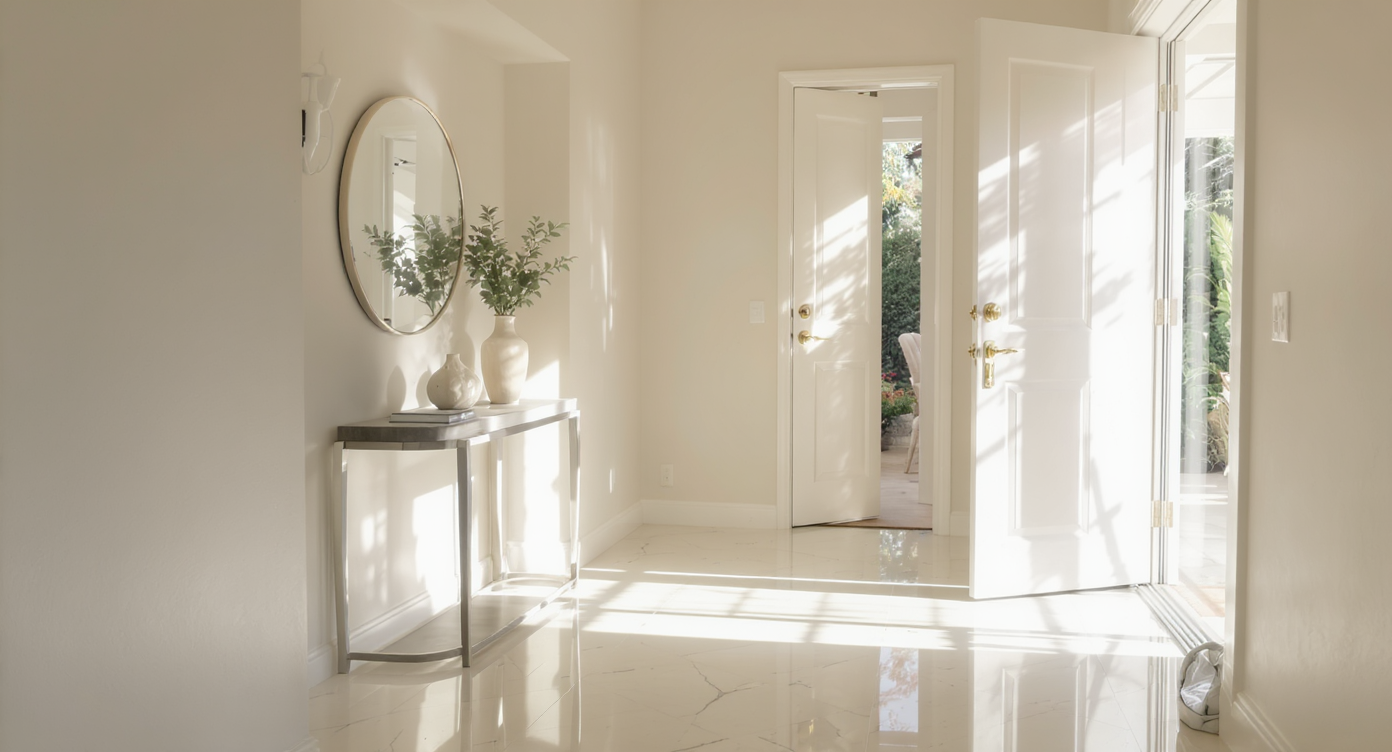TL;DR
Open houses drive a small share of sales, but a no-show can erode momentum and trust. Act quickly: escalate to the broker, demand backup coverage, and shift marketing to channels that actually convert. If you’re in a relocation program, clarify your rights and consider switching to a co-listing or new agent without losing benefits.
No show! A breach of trust?

A pristine entryway sets the stage, reflecting the care taken before an open house begins.
A listing agent no-show at your open house feels like a gut punch. You did the work; the door never opened. Here’s the thing: agents often estimate that open houses directly produce fewer than 5–7% of sales, while most buyers come through online real estate marketing, private showings, and agent-to-agent outreach. Still, a no-show is a trust breach that can cost you time and leverage in a market where days-on-market matters now.
National Data Insight
Homes rarely sell at the open house itself, but momentum sells homes. Agents report that fewer than 1 in 15 transactions begin with an open house lead, while over 80% of buyers start online and schedule private showings. Market analysts also suggest that listings with professional photography and 3D tours can receive 30–50% more views and sell 10–20% faster compared with basic photo sets.
Why this matters: a missed open house isn’t the end of your sale, but the absence of communication is. Speed to inquiry remains one of the strongest predictors of conversion; teams that respond to buyer questions within the hour consistently book more private tours the same week.
Data visualization note: a simple bar chart comparing lead sources (online portals, agent networks, private showings, open houses) clarifies where real estate marketing actually converts.
Alt text: A dark front porch with a folded open-house sign. Caption: A missed open house reduces confidence more than it reduces actual buyer demand.
Anecdote
A seller who lost a prime Sunday to a no-show rebuilt momentum by hosting a twilight “make-good” on Monday, texting every agent who had favorited the listing. Six private showings followed, and an offer arrived within 10 days—proof that process can outrun a bad weekend.
Regional and Segment Patterns
Open houses are most effective where foot traffic is built in. In dense, walkable metros—think Boston, Washington, Seattle—weekend opens can generate 20–40 groups in two hours when pricing and presentation are dialed in. In car-dependent suburbs or cold-weather markets outside spring, 5–10 groups is common, and private showings dominate.
Agents note that Sun Belt metros with rapid growth and new construction often rely less on open houses because inventory is plentiful and buyers prefer scheduled tours. By contrast, tight-inventory tech hubs often see fewer cancellations and more re-scheduled private appointments, which blunts the damage of a single missed event.
Seasonality matters, too. Listing momentum tends to peak March through June in many regions; missing a prime weekend in late fall can add a week or more to days-on-market, according to listing teams who track uptake across seasons.
Behavior and Market Psychology
Trust is the real currency. Sellers expect accountability; buyers expect access. When neither happens, doubt creeps in. Agents often advise that a no-show triggers two avoidable assumptions: “Is the seller difficult?” and “Is the agent inattentive?” Both slow a sale.
Anecdote 1: A couple with elderly cats vacated for a Sunday open, only to learn the agent never arrived. They alerted the brokerage, switched to the co-listing agent as lead, and hosted a make-good twilight open the next day. They booked six private showings that week and received an offer within 10 days.
Anecdote 2: In the mountains near a national forest, a seller met early prospects in the driveway after an agent delay, gave an impromptu outdoor tour, and scheduled a private showing through the buyer’s agent for the next morning. That buyer ultimately wrote the offer. The lesson: access and follow-up beat one-time events.
Quotable: “Homes with clear access plans and rapid responses sell faster. Buyers forgive scheduling hiccups; they don’t forgive silence,” say managing brokers who triage weekend mishaps.
Secondary Insight: Relocation Programs and Coverage
Relocation can complicate incentives. Agents commonly report that many relocation companies take 35–45% of the agent’s commission as a referral fee. That doesn’t excuse poor service, but it explains why some relocation agents are stretched thin and why coverage plans must be explicit.
What top teams do: they document a backup host, publish a brokerage-level escalation path, and switch to co-listing if one agent’s availability changes. Homes with a written coverage protocol—who opens, who fields sign-ins, who confirms next-day tours—avoid gaps that cost weekends.
Actionable timeline after a no-show:
- Within 24 hours: email the managing broker to log the incident, request a written backup plan, and, if desired, move the co-listing agent to primary.
- Within 48 hours: run a “make-good” event—a twilight open or by-appointment block—and message every agent who favorited the listing on the MLS.
- Within 72 hours: shift spend to what converts: refresh the lead photo, push a price-improvement or closing-cost headline if warranted, and schedule stacked private showings.
Quotable: “Broker-level coverage is non-negotiable. Someone should always be five minutes from your door,” say veteran listing managers.
Visualization Scenario
Picture a simple dashboard: inquiries by source, response times, and next-day tour slots. Alt text: a clean table of leads with green checkmarks for scheduled showings. Caption: Speed to response converts curiosity into appointments.
FAQ
What should I do if my realtor no-shows an open house?
For home selling and “realtor no-show open house,” email the managing broker immediately, request a new listing agent or co-listing, and schedule a make-good event within 48 hours.
Can I switch listing agents during a relocation company contract?
For relocation company and listing agent changes, ask your relocation counselor and broker about switching in-brokerage; many programs allow a replacement agent without losing benefits.
Do open houses sell homes, or is real estate marketing online more effective?
For open houses and real estate marketing online, agents say fewer than 5–7% of sales start at an open; online listing photos, 3D tours, and fast follow-up drive most conversions.
Who owns the listing photos if I fire my agent?
For listing photos and home selling, photographers typically own the images; your agent/broker holds a license. Ask the broker to keep the license active if you switch agents internally.
What’s the best backup plan for an open house if my agent is unavailable?
For open house and backup plan, require a written coverage protocol naming a backup host, broker escalation, and a 60-minute communication rule for cancellations.
Market Outlook and Reflection
Here’s the reality: open houses are marketing theater. They create buzz, but the sale is almost always won through pricing discipline, access, and fast follow-up. The no-show isn’t fatal; the absence of structure is.
For sellers
- Escalate to the broker and request a replacement or co-listing lead. Your listing agreement is typically with the brokerage, not the individual agent.
- Demand a written coverage plan: named backups, who holds keys, how cancellations are communicated, and a 60-minute response standard for inquiries.
- Rebuild momentum: schedule a make-good open within 48 hours and personally invite every agent who has shown interest. Add a short-term incentive (e.g., seller-paid home warranty) to refresh attention.
- Protect your assets: clarify who owns listing photos. Photographers usually hold copyright; agents license them to market your home. Ask your broker to keep the license active if you switch to another in-house agent.
- Instrument the listing: front-door video doorbell, lockbox audit trail, and an open-house sign-in app ensure visibility and follow-up.
For buyers
- If you encounter an empty open house, text your agent to book a private showing. Serious listings will make room the next day.
- Judge the property, not the mishap. Great homes sometimes have imperfect weekends.
Deals don’t die from bad Sundays; they die from bad systems. Put a system in place. Tools like ReimagineHome can help you create polished listing visuals and alternative room styles fast, so buyers see potential even if opening weekend went sideways.
.svg)

.svg)














.png)